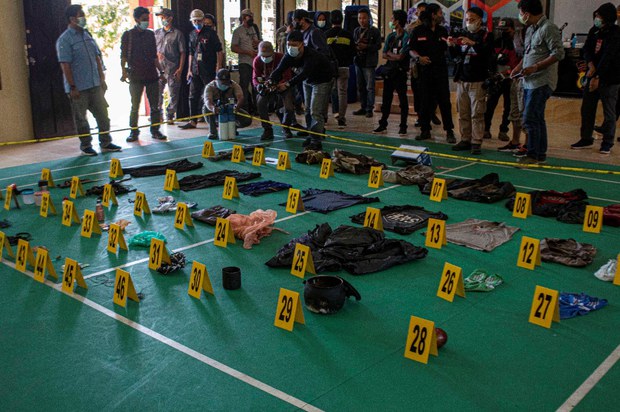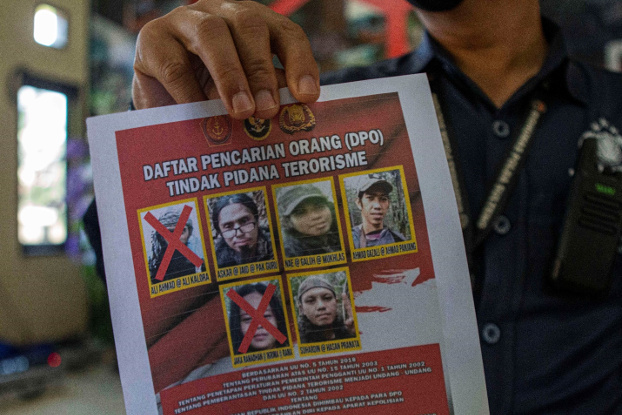Indonesian Analysts: MIT Leader’s Killing May Bring about Militant Group’s Demise
2021.09.20
Parigi Moutong, Indonesia
 Journalists photograph a display of items at the Parigi Moutong Police Station in Central Sulawesi province that were confiscated after Eastern Indonesia Mujahideen leader Ali Kalora died in a shootout with security forces, Sept. 19, 2021.
Journalists photograph a display of items at the Parigi Moutong Police Station in Central Sulawesi province that were confiscated after Eastern Indonesia Mujahideen leader Ali Kalora died in a shootout with security forces, Sept. 19, 2021.
The killing of an Indonesian militant leader during a shootout with police in Central Sulawesi province may spell the demise of his pro-Islamic State group because he had no apparent successor, terrorism analysts said.
Security forces gunned down Ali Kalora, the top commander of the Eastern Indonesia Mujahideen (MIT), and one of his followers who was identified as Jaka Ramadhan, in the jungles of Parigi Moutong regency on Saturday. The deaths reduced MIT’s members to four, with police vowing to capture the remnants “dead or alive.”
“MIT was already very weak and only survived on stealing farmers’ crops at the foot of the mountain,” said Ridlwan Habib, a security expert and researcher at the University of Indonesia.
“I believe these four people will be caught soon or turn themselves in,” Ridlwan told BenarNews.
None of the surviving MIT militants could potentially replace Ali, analysts said.
Ali’s likely successor, Muhammad Busra (also known as Qatar), was killed by security forces in July, said Muh Taufiqurrohman, a researcher at the Center for Radicalism and Deradicalization Studies (PAKAR) in Jakarta.
“Now the four who are on the run are leaderless and sooner or later they will be caught or killed,” Taufiqurrohman told BenarNews. “MIT is militarily coming to an end.”
Police said they were able to identify Ali’s remains through his family.
“Ali Kalora’s wife and two children came from Poso on Sunday afternoon and we immediately took DNA samples and matched them,” police spokesman Bronto Budiyono said.
After the identification, Ali’s body was buried in the provincial capital, Palu. Bronto said Ali’s widow approved the burial about 200 km (125 miles) from Poso regency, where MIT is based, to avoid a gathering of his supporters.
“Ali must have a lot of sympathizers in Poso. We don’t want his sympathizers to gather in Poso and cause security disturbances,” he said.
Jaka’s body was buried in Palu as well without the presence of family members who live in Banten province near Jakarta.
The MIT insurgency is concentrated in Indonesia’s Sulawesi region and is rooted in a Muslim-Christian conflict, which left more than 1,000 people dead between 1998 and 2001.
Many in Poso remain hostile toward the other side over land rights, Taufiqurrohman said.
“If this is not resolved, it could have serious consequences,” Taufiqurrohman said.
Another analyst, Harits Abu Ulya, a researcher at the Community of Analysts on Ideological Islam think-tank, said Ali’s death should reduce the threat of terrorism in Poso, Parigi Moutong, and Sigi – three Central Sulawesi areas where MIT has been active.
“I expect that those who remain in the jungles will be demoralized,” Harits told BenarNews, adding that they hardly had few weapons.
“They may have one homemade revolver and a few homemade bombs, but nothing else,” he said.
Even if all are captured or killed, the ideology of MIT could survive because the group enjoyed support among people in Poso, Taufiqurrohman warned.
“In terms of security, it’s good as Poso will be safer, but if the government and the community don’t work together to build the economy and promote harmony in Poso, other Ali Kaloras and Santosos will emerge,” he said.
Ali succeeded MIT founder Santoso who was killed by police in July 2016. Santoso was the first Indonesian militant to publicly pledge allegiance to the so-called Islamic State militant group.
Authorities said MIT members have been responsible for several killings, including of civilians and police, in Poso and its surroundings since 2012. In its latest attack, police said the group beheaded a farmer and killed three others in Poso on May 11.

Madago Raya
Police and soldiers taking part in a manhunt code-named Madago Raya – the latest iteration of years-long efforts to destroy MIT – will continue to search for the group’s remaining members, said Inspector Gen. Rudy Sufahriadi, the Central Sulawesi police chief who leads the operation.
“Our goal is to rid Central Sulawesi of acts of terrorism. The remaining four fugitives will be caught dead or alive,” Rudy told reporters.
Indonesian authorities have made similar pronouncements in the past but have not yet eliminated the MIT threat although the number of members dwindled to no more than 20 after Santoso was killed. The group operates in rugged and mountainous terrain.
“If they turn themselves in, they will be prosecuted. If they don’t surrender, the task force will continue to pursue them,” Rudy said.
He urged villagers to provide information about the militants, adding that security personnel would guarantee their safety.
“If residents see the four fugitives in their respective areas, immediately report to the nearest task force post,” he said.
After the shootout, Parigi Moutong villagers went about their business as usual.
“I’m still working because we’re entering the rice planting season,” farmer I Made told BenarNews. “We feel safe because it is far from the terrorists’ activities and soldiers and police are regularly patrolling.”
A resident in another village, cocoa farmer Iwan Ahmad, said he and others had stopped working after receiving news of Saturday’s fighting.
“But now people have returned to their fields. We hope that the remaining terrorists can be arrested soon,” Iwan told BenarNews.
MIT is one of two militant groups in Indonesia that have pledged allegiance to the so-called Islamic State militant organization. The other group, Jemaah Ansharut Daulah (JAD), has been blamed for several deadly bombings and terror attacks in Indonesia since 2016.







